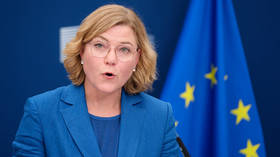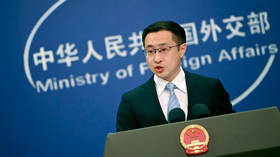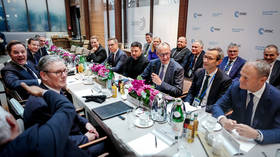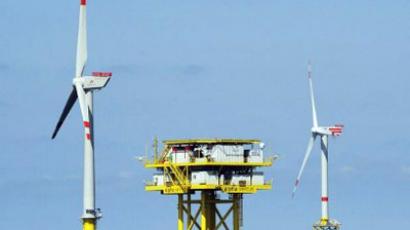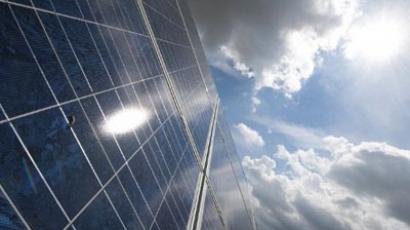Ideology trumps reason as Germans pay the price for abandoning nuclear power
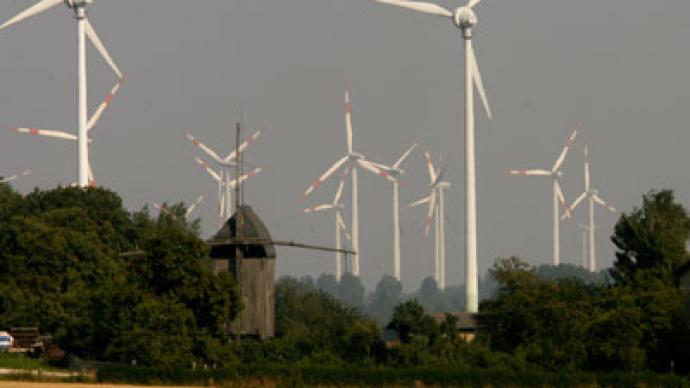
Germany is facing rapidly climbing energy costs after turning away from nuclear power following the Fukushima disaster, instead relying increasingly on renewable energy. Meanwhile, its neighbors are building nuclear power stations on its doorstep.
After a simultaneous earthquake and tsunami off the Japanese coast caused a nuclear meltdown at the Fukushima power plant in March last year, in the worst accident since Chernobyl, Chancellor Angela Merkel did not hesitate.With broad public support, she immediately ordered the closure of eight existing nuclear power plants, with the rest scheduled to be phased out by 2022, nearly fifteen years earlier than planned.Instead, she promised to bolster the role of renewable energy – in which Germany was already a European leader – pledging that 35 percent of all power consumed in the country would be from green sources by 2020, a figure later upped to 40 percent.The changes have been rapid. Nuclear power supplies 17 percent of the country’s energy needs, down from 23, while renewables have climbed from 20 to 25 percent in just months.Now comes the time to pay for Germany’s green vision.Despite technological advances, wind, solar, hydro and other green energy sources still remain an unprofitable investment in a fair market. The way to encourage their exploitation is through a set of feed-in tariffs, a policy where energy companies are forced to buy electricity from green generators at a price set by the government (which is usually legislated to remain the same for two decades).The German government has passed the cost of the payment from the energy companies to the consumer. Every German on the grid pays something called Umlage, a special surcharge for supporting green fuels that covers all the green energy subsidies, however much energy is produced.This week, energy companies announced that the charge would go up by 47 percent for next year. The average Germany household will now pay €250 a year to sponsor green energy producers, four times more than in 2009. The overall value of the subsidy on green energy is likely to exceed €20 billion next year, about one percent of GDP.At the same time, the government has relieved large exporting companies (who consume a fifth of Germany’s electricity) from paying Umlage, for fear of crippling them, thus leaving ordinary Germans to bear the burden.That is on top of what are some of the highest electricity prices in Europe, which have already risen 44 percent since Merkel came to power seven years ago.This is hardly the ceiling.Faced with a scheme in which it seems almost impossible to lose money, German states, industrial giants and even enterprising individuals have all rushed to build wind turbines and solar panel farms.Never mind 35 or 40 percent, at the current rate by 2020 more than half of Germany’s energy will be obtained from renewables – and all subsidized by the taxpayer.“It's out of control,” summed up Kurt J. Lauk, Economic Council president from Angela Merkel’s own Christian Democrats party.Bursting vesselsThe green expansion has also taxed the country’s power grid.As there are no controls on the program other than the promise to pay money for anyone who pumps power into the grid, the construction of facilities has been ad hoc, with no central planning.Inefficient energy sources such as solar, have been chosen alongside relatively reliable ones, like offshore wind, since the government paid for different energy resources based on the cost of using them, not their yield. There has been little consideration of the geographical location of the facilities, and whether there is capacity to transport the produced electricity. In contrast, relatively productive conventional energy power stations have been squeezed out by the subsidized green ones.A case in point: thinly-populated Lower Saxony in the north says it is expanding its wind power capacity to supply industrially-developed and densely-settled Bavaria in the south. But the Bavarian government is also striving for self-sufficiency, planning to use solar power, which is not as efficient. Yet, even if it does go on to buy “cheaper-made” electricity from Lower Saxony (which it has no financial incentive to do, as the taxpayer will pay the difference) there are not yet enough power lines to transport it down there. In the meantime, when northern wind farms start producing electricity, even if there is no market for it anywhere near, energy companies who cannot use it will still be obliged to pay producers.The country has started to suffer from occasional blackouts, as renewable energy sources are more unpredictable – depending on the daily cycle, sunrays, and wind, while maintaining total backup from conventionally-obtained electricity defeats the purpose of the innovations. There is also poor integration between renewable power sources, with their fluctuating supplies and the more traditional ones, many of which can only function efficiently if they are constantly producing energy.Experts estimate that a further €300 billion may need to be invested into the grid over the next decade alone.Power politicsFacing an attack from those within her own party, coalition partners, opponents and businesses Merkel, who faces an election in a year, has gone on the defensive.“We have achieved a lot but we are far from being where we should stand,” she said during an assembly of the German Employers Association on Tuesday.Merkel conceded that she is now hostage to renewable energy producers, who’ve been promised decades of guaranteed profits and have often invested billions themselves in power resources that could never survive in an open market."When a great number of people benefit from a law then it of course gets always more difficult to override that law by democratic means," she said.Merkel’s hand could still be forced if higher bills are accompanied by more severe power cuts during the winter (the hardest time for renewable energy producers) or damaging stories of inefficiency. One such recent example detailed how federal authorities are spending billions extending the power grid out into the sea (as it promises under its renewable energy legislation) towards sites of wind turbines that have not yet been built (according to the same laws its private owners are under no obligation to actually construct them).The environmental ministry is already devising a plan to hem in the uncontrolled sprawl of green power.Yet Merkel insists that the current problems require correction and not an overall re-think, and that once they are overcome “Germany will be a model for many countries around the world in how one can achieve a sustainable energy supply.”This may be so, but a recent survey showed that two thirds of Germans were not prepared to pay more than €50 each for the reform – a laughably small figure compared to what they have already paid, directly and through taxes, and nothing compared to the costs that lie ahead.Across the border…Germany’s foray into renewables has not converted most of its neighbors and a number of them are planning to construct nuclear power plants of their own, just as Germany is getting rid of hers.Of the nine countries bordering it, only Denmark, Austria and Luxembourg do not produce nuclear power.Indeed, most of the countries to the east are aggressively expanding their nuclear program.Poland has just confirmed it will spend €12 billion on its first atomic power plant. The Czech Republic is taking bids to expand a Soviet-built facility, while Slovakia is completing a plant of its own. Russia is building a nuclear power station in its enclave of Kaliningrad, bordering Poland, and Belarus is also planning to start construction on its first facility on the western border.On its western side, France and Belgium both receive more than half of their energy from nuclear power and have done for decades.An accident on the scale of Chernobyl in any of those countries – the main fear of the anti-nuclear lobby – would be almost as likely to severely affect Germany as the origin country.With the rapid phasing out of its nuclear plants, the German government has looked at the opinion polls (which show its citizens continue to be fiercely anti-nuclear) and not the spotless safety records of its power stations. Beyond the headlines, the impact of the drastic step will be to marginally lower what is already a historically minute risk, whatever the horrors of the few high-profile accidents.This move, together with the equally swift embrace of renewable energy, shows the country embarking on an idealist environmental revolution, in which economic factors seem to have been the smallest of considerations.Wading ever deeper into it in the midst of a Eurozone crisis, Germany seemingly cannot turn back, but will now doggedly carry on upon the course it set itself.
Igor Ogorodnev, RT





